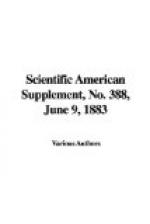It might be well to add in this connection that I have frequently been consulted, by those taking salt-water baths, as to the care of the hair during and after the bath. If the bather is in good health, and the hair is normal, the bather can go into the surf and remain at least fifteen minutes, and on coming out should rub the hair thoroughly dry with towels.
Ladies should permit it remain loose while doing so, after which it can be advantageously dressed.
It is, however, often injurious to both men and women having some wasting of the hair to go into the surf without properly protecting the head; the sea water has not, as is often thought, a tonic action on the scalp; on the contrary, it often excites irritation and general thinning. Again, it is most decidedly injurious to the hair for persons to remain in the surf one or two hours, the hair wet, and the head unprotected from the rays of the sun. This latter class of bathers, and those who hurriedly dress the hair wet, which soon becomes mouldy and emits a disagreeable odor, are frequent sufferers from general loss and thinning of the hair.
An agreeable and efficient adjunct after ablution, which I have already referred to, is oil. Oil has not only a cleansing action upon the scalp, but it also overcomes any rough or uneven state of the hair, and gives it a soft and glossy appearance.
The oil of ergot is particularly serviceable in fulfilling these indications, and, at the same time, by its soothing and slight astringent action upon the glands, will arrest the formation of scurf. In using oil, the animal and vegetable oils should always be preferred, as mineral oils, especially the petroleum products, have a very poor affinity for animal tissues.
Pomatum is largely used by many in place of oil, as it remains on the surface and gives a full appearance to the hairs, thus hiding, sometimes, the thinness of the hair.
It will do no harm or no special good if it contains pure grease, wax, harmless perfume, and coloring matter, but it is often highly adulterated, or, the fat in it decomposing, sets up irritation on the part to which it is applied. I therefore always advise against its use.
The comb and brush are also agents of the toilet by which the hair is kept clean, vigorous, and healthy. The comb should be of flexible gum, with large, broad, blunt, round, and coarse teeth, having plenty of elasticity. It should be used to remove from the hairs any scurf or dirt that may have become entangled in them, to separate the hairs and prevent them from becoming matted and twisted together.
The fine-tooth comb, made with the teeth much closer together, can be used in place of the regular toilet comb just named when the hair is filled with very fine particles of scurf, dirt, or when parasites and their eggs infest the hairs. It should, however, always be borne in mind that combs are only for the hair, and not for the scalp or the skin, which is too often torn and dug up by carelessly and roughly pulling these valuable and important articles of toilet through the skin as well as the hair.




